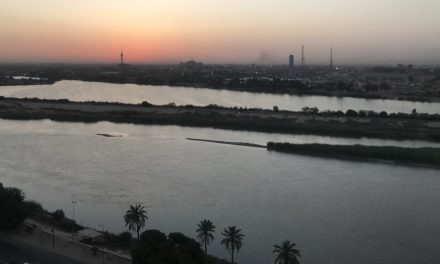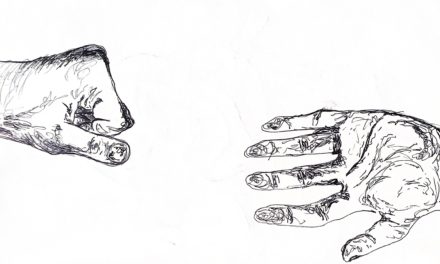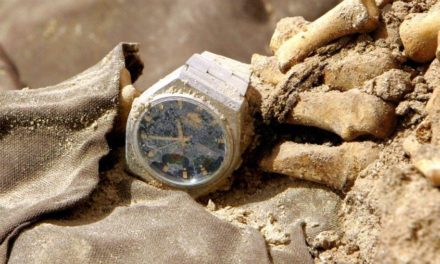(Protestors in Basra. AP)
Basra city, located in Southern Iraq, has many natural resources that can make it a rich provincial capital. However, incompetence and corruption in government has played a critical role in preventing its citizens from receiving basic necessities of life, such as electricity and clean water. Multiple political parties have taken the helm of Basra’s governorship since 2003 and have failed in investing Basra’s geopolitical importance. Thus, it is expected that Basra will remain a big problem for the upcoming years.
Economically, Basra is Iraq’s oil heartland. The majority of Iraqi oil fields are stationed there and so the presence of multinational oil companies is commonplace. Basra alone contains 59% of Iraq’s oil reserves. Nevertheless, Basra suffers from high unemployment, collapsing infrastructure, and the growth of slums.
Environmentally, Basra is the only Iraqi port through its seafront on the Persian Gulf, alongside the marshes that have been described as unique settlements comprising a set of various diverse fauna and flora. When I was a university student, I was interested in reading the reports written by international organizations about the marshes. Iraq’s marshes had been considered amongst the unique places that are “home to indigenous communities for millennia.” Faced with many years of neglect and systematic destruction as a result of wrong environmental policies and systematic destruction by Saddam’s former regime, the marches are now negatively affected by drought and desertification.
The Tigris and Euphrates Rivers meet at the Shat al-Arab to give the city a wonderful tourism location. Three years ago, I attended a scientific conference at the Arab Gulf studies Center in Basra and witnessed how attraction sites get filled with piles of urban waste. Currently, Basra is suffering from high levels of water pollution that has led to infect thousands of innocent people with poisoning.
Demographically, Basra is an urban area that is going to face more social tensions. It has received many Iraqi immigrants in the past few decades. This resulted in increasing the economic burdens on its residents. Nowadays, many appeals have surfaced for demanding the others to leave the city. “Basra for Basrawis” is a motto that is now commonly used by locals. Uncontrolled population growth and limited job opportunities will inevitably yield a dangerous social explosion. The future statistics of Basra’s population can help address the absence of an effective population policy in addition to the other challenges the city faces.
Basra is also experiencing the proliferation of unauthorized arms. All political parties dream of dominating the oil-rich city. For years, militias connected to political parties have tried to control one of the city’s oilfields or one of its major border crossings. Furthermore, tribes are currently moving from the rural areas into the city center, bringing with them their gun culture. Hence, it is not surprising to know that a bulk of social problems is now solved by resorting to armed violence. In such a case, it is largely anticipated that crime and chaos may grow in Basra and lead to a greater threat to the rest of Iraq.
Drugs are extensively thriving in Basra’s society. They are transported there from neighbouring countries. Consumers and traffickers are noticeably increasing. This is another sort of terror that will put the future of Basra at risk. The drug cartels and organized groups of criminals are exploiting the weakness of the state and their links with corrupt political parties extend the extent of their unlawful businesses. This will make Basra city unlivable for many families and intellectuals who are contemplating leaving.
Basra had been one of the cultural hubs of Iraq as it flowed with culture and knowledge from the numerous Basrawi scholars and poets. Unfortunately, Basra today has lost that advantage, as the tribal mentality and narrow interpretations of Islam dominate social interactions, with literacy rates falling. These inputs are vital for these forces to sustain their role and interests in this city. They all worked towards devastating Basra’s cultural value and could spread ignorance wherever they want. However, Basra and its people are still fighting against this struggle.
Basra is now witnessing protests in which its inhabitants are expressing their resentment at bad services and so it is correct to say that Basra’s unsolved problems represent a time bomb to the Iraqi state that might vigorously explode in the future. Basra’s crises are an example of what is going on in other Iraqi cities.
Ignoring such issues will give rise to destroy the functional importance of this economic Iraqi metropolitan. Therefore, there is an urgent need to activate the role of regional planners in tackling many of these obstacles. Establishing a national and fair government remains as one of the best options that Iraqis bet on. How long we have to wait till this dream is met is the question that has yet to be answered.

Diyari Salih
Diyari Salih is an Iraqi academic with a PhD in Political Geography, Baghdad and a Post-Doctorate in International Relations, Warsaw, focusing on geopolitical issues in Iraq.










